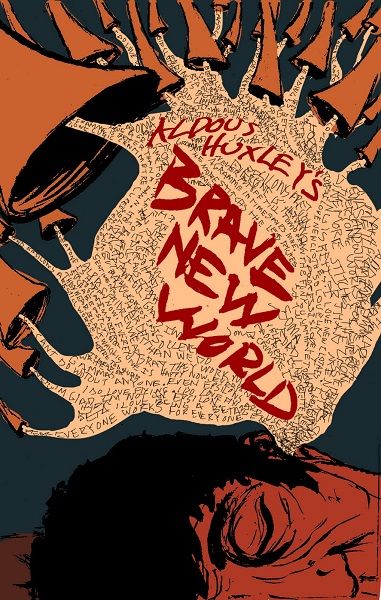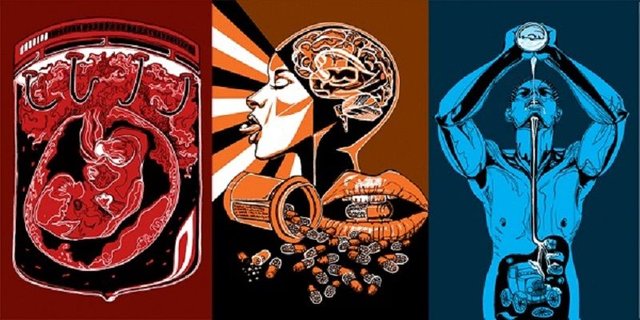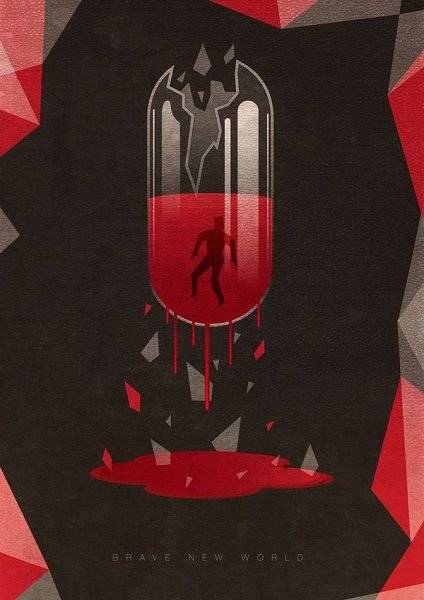"The Brave New World" by Aldous Huxley - a logical test of the free will

You are planned and you are damned in this brave new world
(Iron Maiden – Brave New World)
I started this text with the idea of writing an inspirational review of one of the most influential books of the twentieth century. It turned out that impressions of it were too many, too strong, often too contradictory - and too difficult to organize - at least at this stage. Here comes the rather the essayist form of the following lines - away from the original idea of a traditional book review. Besides, I have subconsciously called for dialogue, with people familiar with the work, instead of creating a performance for the untouchables. Maybe I'm wrong too, judge for yourself. Books like "The brave new world" make me think that every unique idea in fiction has already been invented and considered at the beginning of the last century, and each new book is then just a variation on an old subject. Aldous Huxley wrote his novel in 1931, at a time when the world was anything but wonderful. The era between the two World Wars, the years of the Great Depression, the emerging totalitarian regimes, the Hollywood comic masses, and the desperate, noisy, escape from reality. Many say that "The brave new world" is utopia. How else can we describe a world in which everyone is happy and satisfied with their place in a society where there are no illnesses, old age and wars in which the common good is placed over the individual and everything is achieved without violence?
"The brave new world" by Aldous Huxley is the last of the three great anti-twenties of the twentieth century coming after George Orwell's undisputed leader "1984" the less impressive Ray Bradbury's "Fahrenheit 451". It is also the most different, provocative and ... philosophical (in the widest sense of the term, of course) of the three. While Orwell and Bradbury are building worlds that are framed with geometric precision as unattractive, repulsive and terrifying - created with the idea of being criticized and attacked by the reader - at Huxley the approach is quite different. His gaze is precisely concealed behind misleading logical objectivity.

"The brave new world", in this line of thought, is a true utopia in the tradition of Mor, Campanella and Bacon. The basic principle of the future built by Huxley is happiness and it is fully achieved. This is a world created and tested in a cuvette - a reality in which people are not born (this is forbidden and considered to be "perverted"), but they are deferred in factories and chemically and factory regulated - by physiological manipulation of the fetuses, calculating with precision their future physics, brain activity, etc. - to become a specific piece of the public puzzle. I will not reveal its appearance because, as it’s sketched in a brief account, it doesn’t bear that feeling - the feeling that the Huxley civilization is actually utopia, desirable, and correct. The author skillfully captured some of the strongest human aspirations (related to sexuality, intoxication and fun), bringing them to absolute satisfaction, diverting cleverly away from the real worrying concepts in his otherwise ideal reality. Huxley creates a world without drama-the existence is smooth and firm like marble, unbroken by contradictions. This is a world without art (what else is born of it if not from the drama of life?), Without God and religion- a world of the originally determined happiness. In "The brave new world" happiness is a self-imposed category - it is not achieved through truth and beauty, it is opposed to it.
Unlike the world masterfully erected by Orwell, which is bleak and threatening, weighing the reader from start to finish and creating preconditions for resentment and rebellion in society itself, it is not so in the Huxley universe. His society is happy and completely satisfied, not subject to any oppression or horrific dictatorship, and the "inconsiderate" - like Bernard and Helmholtz - remain firmly connected with his constituencies. Their personal "mute" against these civilian pillars is uncertain, passive, impotent. The rebellion here is "imported" outside. John (or the so-called "Wild"), the inhabitant of the only wild place in this future of Huxley, a reserve for Indians living in a natural environment that looks more like ghettos with shacks than cities - is being extradited to London for conducting a social experiment on their adaptability. He is along with his mother, Linda, a former member of the same civilized society, lost in the wild after an accident and also conceived by accident. Here Huxley confronts the two worlds - John's old, unsteady, unbridled, free reality, and the "The brave new world" of Bernard and Helmholtz. Originally, violently attracted to him, John gradually began to disglect himself from the civilization he had encountered. This leads to a rift, revealed through an impressive dialogue between him and one of the supreme rulers (translated into the hateful for many of us "Controller") in the world of Huxley, unfolded in the last chapters of the book. Again, the author does not fall into the trap of anticipated expectations.

While the reader, who must have been compassionately sympathetic to the Devil, who has fallen into this world so different from his inexplicable, strange and contradictory to all his principles, is expected to be involved in the suffering of the young man , something surprising happens. The verbal battle between the two defenders of totally defeated resistors was won by the Controller - with many logical arguments and detailed explanations, in fact, he fully justifies the existence of such a world of such an abbess as the savage thinks. His position, on the other hand, is rather defensive - John's affinities are noticeably more rare, distinctly more naive, uncertain, even ridiculous, despite the appropriate quotes from Shakespeare he uses to illustrate what he wants to say , but can’t express in his own words. In this dispute he is not a worthy adversary. His - our - reality is losing. Rationally, this "The brave new world" is actually represented as utopia, not anti-utopia. Logic worries.
However, "The brave new world" is not a book of logic. It is a book written in spite of this logic. And you will feel this after the tragic ending, after reading the last page with uncertain, bitter taste in the mouth and awkward feeling about yourself and the splitting you so hard you fought, slipped, ah, too clever by the treacherous Huxley. Then you will understand that "The brave new world" is a precise logical construct that has to provoke the supra-logical, irrational, or otherwise human, reader to self-destruct and self-incriminate. But not before he hurt us, showing us that such a reality is attractive to all, despite the inner voice, escaped from Huxley's slippery logical pitfalls, and triggered the red light not in our heads but in our hearts. His ideal world is guided and controlled not by horror - as with Orwell - but by desire - by a nihilistic hedonism (let's now remember the ideas underlying capitalism - as an additional food for reflection). Here the utopian ideal is achieved. The way this happened, however, creates the painful tension and constant restlessness of the reader. While the mind fights with precise, mathematical explanations, backed by scientific, historical, even ethical arguments, why in the universe of Huxley this world is the right ending point, then in the emotional clash with this complete human "mechanization" brought to a glamorous and triumphant perfection, something under the spoon does not stop to overturn.

That's why "The brave new world" becomes a logical utopia and emotional anti-utopia that puts the topic of "(not) perfect future" into a new, more complex, not one-sided, and less easy to interpret - as Orwell and Bradbury - light. Huxley provokes us to look at both sides of the coin, at the same time, challenges us to look at the two possible realities (in his universe) and to appreciate them as impartially as possible. Will the free will of this test stand? And what are we willing to sacrifice to be truly happy?
"Brave New World". What an amazing book of literature by Aldous Huxley. Believe it or not our High School teacher had us read this book back in 1980. I was blown away by it when I read it. I believe society now is in search of "Soma" in a way that it hasn't been before.
Yes, I am agree with you. I think there are two script on which people are to fall into the trap of totalitarian practices. The first is through positivity and happiness (The Brave new world), the other is through repression (1984). The society goes to the scenario of "The Brave new world" now :)
great post, thank you so much for sharing this
No problem. You are welcome :)
I agree. I was incredibly inspired by Huxley from an early age...a designer drug akin to Soma, think methadone!
I loved the book. Thanks for your writing a complex topics. You make it more understandable for me.
You are welcome :)
Are you familiar with "A Brave New World Revisited?"
No. From Huxley I have read only his lectures, "The Doors of Perception", "The brave new world" and Heaven and Hell. I have a pale memory that I read somewhere this book is not so valuable as the first part.
I recommend 2150 by Thea Alexander
THanks I will see it :)
It is a series of Huxley's essays, written 30 years later, covering themes within A Brave New World. I find his observations on individual freedom most interesting.
Oh! Thanks for mention that! I always think it is just the second book of "The brave new world". I will certainly read them!
This was quite interesting! I read the book "Fahrenheit 451" before and found it really good and impressive. Now I would like to read your recommendation.
Thanks for sharing this!
You are welcome. If you like this kind of books (Anti-utopian) I recommend to you also "1984" by Orwell, "We" by Yevgeny Zamyatin and Kurt Vonnegut's "Player Piano" :)
I heard about the "1984" book before and already put it on my reading-list ^^ Thanks for the tip ;) I really enjoy reading such books!
Okay, if I bring to my mind some other value book of this kind I'll write to you. :)
This would be great :D Thank you very much!
Professional art
yep :)